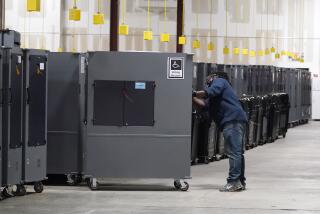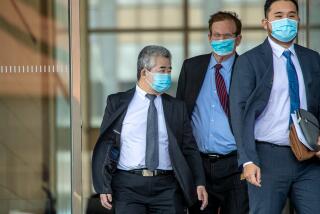Westinghouse Bribery Trial Underway : Lawsuit: Philippine government alleges the company paid about $17 million in bribes for a contract to build a nuclear power plant.
- Share via
NEWARK, N.J. — Opening arguments began Wednesday in a civil lawsuit against Westinghouse Electric Corp., culminating a five-year drive by the Philippine government to call a major American company to account for allegedly bribing the country’s former dictator.
The suit in federal court here charges that Pittsburgh-based Westinghouse paid about $17 million in bribes in exchange for a contract to build a $2.2-billion nuclear power plant that has never been used.
The bribes are said to have been paid in the mid-1970s to a front-man for the late Philippine President Ferdinand E. Marcos. The suit is part of an effort by the new Philippine government to recover Marcos’ ill-gotten profits and those alleged to have been earned by the companies with which he did business.
Mark Augenblick, the Philippines’ lead lawyer in the case, argued that Westinghouse and a smaller company allied with it funneled millions of dollars in bribes to Marcos’ numbered Swiss bank accounts through a “bagman” who was one of Marcos’ closest personal associates.
In exchange, he asserted, Westinghouse won the contract with no competitive bidding, beating out rivals such as General Electric. At Marcos’ direction, the Philippines electric utility allegedly awarded the contract to Westinghouse even before the company drew up a detailed proposal for the plant.
“Westinghouse got the contract because Marcos fixed it, plain and simple,” Augenblick told jurors.
Westinghouse strongly denies paying bribes, although it acknowledges paying money to Herminio T. Disini, a former Marcos confidant and business associate.
In court, Westinghouse attorney David Boies admitted that this “was not a great way to do business.” But Boies contended this was standard procedure in the Philippines, and that Disini was merely a “lobbyist” or “special sales agent” and did nothing illegal for Westinghouse.
The suit was filed in 1988, two years after Marcos fell from power. The U.S. Justice Department and the Securities and Exchange Commission investigated the allegations but filed no charges. A special panel of the International Chamber of Commerce reviewed the case and found no evidence of bribery.
Nevertheless, Westinghouse has tried hard to settle the case. A tentative settlement that would have allowed Westinghouse to operate the plant fell through a year ago. The company continued its efforts right up to the start of the trial.
The trial’s public airing of the evidence against Westinghouse, including internal documents and notes written by Marcos himself, comes as the company is beset by problems. These include the resignation in January of Chief Executive Paul Lego, who was pressed to leave by Westinghouse’s board.
More to Read
Inside the business of entertainment
The Wide Shot brings you news, analysis and insights on everything from streaming wars to production — and what it all means for the future.
You may occasionally receive promotional content from the Los Angeles Times.










